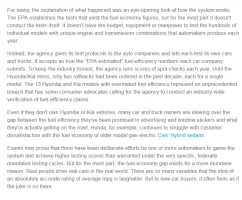Yeah, not done... I simply think that the idea of misinformation being on a forum is a disservice to everyone who doesn't know the difference. Unfortunately, in this case, I feel like I am explaining that the earth is not flat to someone of a primitive civilization.
I did not 'deflect' from anything. I simply proved that your suppositions were not entirely accurate. You tried strange analogies, 'science', and various other ways to explain away my comments, and you failed each time. And I am pretty sure I understand your claims, which is why I know your claims aren't accurate in the context of this discussion.
When asked for proof - you provided none. You simply took a high-brow approach and tried to sound smarter than you are. Of course you're free to believe what you wish and mentally generate whatever MPG numbers you want - but that doesn't make your beliefs true.
Let's try this, I'll ask you direct questions that have a yes or no answer and let's see what you say. If you don't understand a question feel free to ask for clarification. Please keep in mind, these aren't nuanced questions. A simple yes or no will be sufficient. (No peeking, the answers are at the end of the test.)
1) Do you believe that manufacturer's horsepower ratings = customer dyno horsepower ratings?
2) Do you think that Kia has created a 100% efficient RWD drivetrain for the Stinger?
3)Do you think that Kia has created a 100% efficient AWD drivetrain for the Stinger?
4) Do you believe that drivetrain efficiency affects the possible difference in horsepower mentioned in question #1?
5) If the answer to question 4 is no, using another causation, can you account for any difference in between the manufacturer's horsepower rating and customer dyno horsepower rating as mentioned in question #1?
6) If there is no difference between the drivetrain efficiencies for AWD and RWD, would you contend that both AWD and RWD are 100% efficient?
7) If both systems are less than 100% efficient but still equal, can you explain the reduction in efficiency from 100%?
8) Do you believe drivetrain efficiency affects fuel economy?
9) If you answered yes to question 8, do you believe it is possible for two comparable Stingers with different drivetrain efficiencies to have the same fuel economy?
10) If you answered yes to #9, can you account for how a Stinger with a less efficient drivetrain can achieve the same fuel economy as the Stinger with the more efficient drivetrain.
...between AWD and RWD STINGERS. A slightly important distinction. What evidence do you have that a RWD Stinger gets better gas mileage than an AWD Stinger? -Zero-. Evidence using -other- makes/models of vehicles.
What I provided was a real-world test by a reliable source for the -specific- models the OP had asked about, and their results do not match up with your claims.
How -hard- can this really be for you to understand?
In the past, for other models, for other brands, for other AWD technologies, there may very well have been drastic differences in gas mileage between the two systems. But this is 2018. Apparently, Kia themselves believe that their RWD and AWD vehicles have identical (or NEAR identical enough) ratings. You 'deflected' to the KIA MPG claims from 5 -years- ago. The C&D article supports my claims - and Kia's - at least for now.
This is taken from "the official U.S. government source for fuel economy information." If you notice, there is a 1mpg difference in city mileage. Other 2019 AWD/RWD Kia models show differences between EPA ratings for AWD/RWD. They all favor the RWD model. Furthermore, other manufacturers also show mileage differences between the AWD/RWD favoring the RWD. A reminder that this 1mpg represents a 5%-7% difference between the AWD/RWD Stingers.
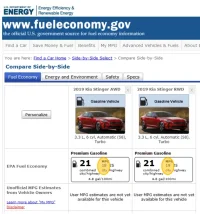
I've never claimed that AWD gets 'better' gas mileage than RWD. Not sure where you got that idea from.
Okay, granted. Is it safe to say that you have contended that there is no difference in AWD/RWD mileage? If so, please present one piece of evidence from any website or forum that states that there is no mileage "penalty" for an AWD drivetrain.
I
When asked for proof - you provided none. You simply took a high-brow approach and tried to sound smarter than you are. Of course you're free to believe what you wish and mentally generate whatever MPG numbers you want - but that doesn't make your beliefs true.
There is no easy way to "prove" that AWD Stingers cars are less fuel efficient than RWD Stingers. It would require removing the engine, dyno'ing the engine at the crank, reinserting the engine and then dyno'ing it in the car. Both tests would be conducted under load. The difference between the two would be attributable to drive train loss. But there are tons of empirical methods to confirm the efficiency differences. Here are a few...
Drivetrain Power Loss - The 15% "Rule"- Modified Magazine
Drivetrain losses (efficiency) – x-engineer.org
If you are too busy to read the articles, here are some pictures. The caption of the first is the relevant part. The last paragraph of the second is the relevant part.
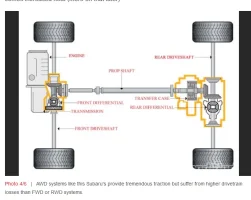
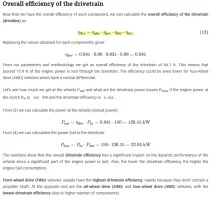
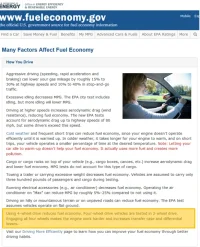
There is no shortage of more stuff like that. However, I was unable to find anything that said the efficiencies were the same between AWD and RWD of ANY make or manufacturer.
As promised, here are the correct answers to the questions at the top:
1) Do you believe that manufacturer's horsepower ratings = customer dyno horsepower ratings?
No, the ratings do not equal each other due to drivetrain losses. This varies by drivetrain. Most efficient to least efficient: FWD, RWD, AWD/4WD
2) Do you think that Kia has created a 100% efficient RWD drivetrain for the Stinger?
No, there is no such thing as a 100% RWD drivetrain. If there was, the horsepower ratings in question 1 would be equal.
3)Do you think that Kia has created a 100% efficient AWD drivetrain for the Stinger?
No, there is no such thing as a 100% AWD drivetrain. If there was, the horsepower ratings in question 1 would be equal.
4) Do you believe that drivetrain efficiency affects the possible difference in horsepower mentioned in question #1?
Yes, this is cause as determined by the SAE and other industry professionals.
5) If the answer to question 4 is no, using another causation, can you account for any difference in between the manufacturer's horsepower rating and customer dyno horsepower rating as mentioned in question #1?
There is no other reason for a difference in Hp ratings when an engine is tested out of the car and then tested in the car connected to the drivetrain.
6) If there is no difference between the drivetrain efficiencies for AWD and RWD, would you contend that both AWD and RWD are 100% efficient?
No drivetrains are 100% efficient. This is a physical impossibility.
7) If both systems are less than 100% efficient but still equal, can you explain the reduction in efficiency from 100%?
It is a physical impossibility for any AWD and RWD Stinger to have the same efficiency provided they are maintained and in proper working order.
8) Do you believe drivetrain efficiency affects fuel economy?
Drivetrain losses are a key factor in determining fuel economy. Driving style, aerodynamics, tire type/size/inflation, etc. are other considerations.
9) If you answered yes to question 8, do you believe it is possible for two comparable Stingers with different drivetrain efficiencies to have the same fuel economy?
Identical Stingers, with the only exception being the drivetrain (AWD/RWD), will have different fuel economies in proportion to driveline efficiency differences.
10) If you answered yes to #9, can you account for how a Stinger with a less efficient drivetrain can achieve the same fuel economy as the Stinger with the more efficient drivetrain.
It is a physical impossibility for any AWD and RWD Stinger to have the same fuel economy provided they are maintained and in proper working order.








